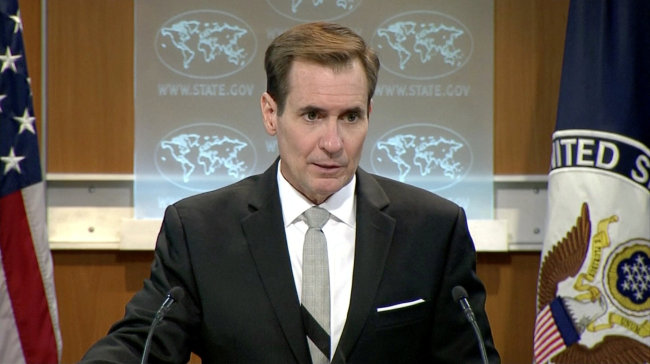U.S. urges N.K. to free detained citizens as Pyongyang threatens to handle them under wartime law
By 임정요Published : July 12, 2016 - 09:06
The United States urged North Korea to free detained American citizens Monday after the communist nation said it will deal with the detainees according to wartime law in protest of Washington's sanctions on leader Kim Jong-un.
The North also said it would "totally cut off" the dialogue channel between the two sides via the North's mission to the United Nations in New York, accusing the U.S. of impairing the "dignity" of its leader with the sanctions that Pyongyang also labeled as a declaration of war.
Two American citizens -- college student Otto Warmbier and Korean-American pastor Kim Dong-chul -- are currently detained in the North after being sentenced to long prison terms for what Pyongyang calls subversive acts against the country.
The North said it will deal with all the issues between the two countries under its wartime law and "the issue of detained Americans is no exception." It was unclear what the wartime handling of the detainees means. But the shutdown of the "New York" dialogue channel suggests the North won't even use the detainees as a negotiating card.
"The welfare and safety of U.S. citizens abroad is one of the highest priorities of the State Department. That's not going to change and we continue to call on the North to cease what is obviously an improper and unjust detention of these individuals,"

Kirby, however, declined comment on the North's shutdown of the "New York channel" that has long served as an important line of communication between the two sides that have no diplomatic relations.
"We call on North Korea to refrain from actions and rhetoric that only further raise tensions in the region. I'm not going to share the details of diplomatic exchanges one way or the other, but none of the rhetoric that we've seen of late is doing anything to increase security and stability on the peninsula," Kirby said.
"And the DPRK knows very well what its international obligations are and should know very well what their obligations are to its own people in terms of proper kinds of decisions and choices that they need to make going forward," he said.
Last week, the State Department released a report on the North's human rights situation, recommending sanctions against 15 top officials, including leader Kim, as well as eight state entities. Of them, the Treasury Department imposed sanctions on 11 officials and five agencies as the others have already been blacklisted for other reasons.
It was the first time the U.S. has imposed direct sanctions on the North's leader, and the designation also marked the first U.S. sanctions on Pyongyang over its human rights abuses. It showed the U.S. is committed to ratcheting up pressure on Pyongyang.
The North's Foreign Ministry reacted angrily to the sanctions, blasting the blacklisting as an "open declaration of war" and threatening to cut off all diplomatic channels with the U.S. unless the designation is revoked immediately.
U.S. experts said the North's reaction is not surprising.
"Pyongyang reacts strongly to any action directly affecting North Korean leadership. So in that respect, it is not unexpected that the North would adopt some sharp measures in response to the recently announced human rights-related sanctions naming Kim Jung-un," Alan Romberg, a distinguished fellow at the Stimson Center, told Yonhap News Agency.
"Although the New York channel has not proven particularly useful for the most part, if the DPRK sees it as in its interest to communicate with the United States, I'm sure it will find a way to do so," he said.
But Evans Revere, a former senior State Department official and currently senior adviser for the Albright Stonebridge Group, said the shutdown of the dialogue channel could be "disturbing and potentially dangerous."
"It has been years since the channel has functioned as an ongoing venue for serious bilateral exchanges and negotiations. But for many years the New York Channel has nonetheless played an important role by providing a communication, coordination, and logistical link between Pyongyang and Washington," he said. (Yonhap)








![[Graphic News] More Koreans say they plan long-distance trips this year](http://res.heraldm.com/phpwas/restmb_idxmake.php?idx=644&simg=/content/image/2024/04/17/20240417050828_0.gif&u=)
![[KH Explains] Hyundai's full hybrid edge to pay off amid slow transition to pure EVs](http://res.heraldm.com/phpwas/restmb_idxmake.php?idx=644&simg=/content/image/2024/04/18/20240418050645_0.jpg&u=20240419100350)





![[From the Scene] Monks, Buddhists hail return of remains of Buddhas](http://res.heraldm.com/phpwas/restmb_idxmake.php?idx=652&simg=/content/image/2024/04/19/20240419050617_0.jpg&u=20240419175937)

![[KH Explains] Hyundai's full hybrid edge to pay off amid slow transition to pure EVs](http://res.heraldm.com/phpwas/restmb_idxmake.php?idx=652&simg=/content/image/2024/04/18/20240418050645_0.jpg&u=20240419100350)

![[Today’s K-pop] Illit drops debut single remix](http://res.heraldm.com/phpwas/restmb_idxmake.php?idx=642&simg=/content/image/2024/04/19/20240419050612_0.jpg&u=)